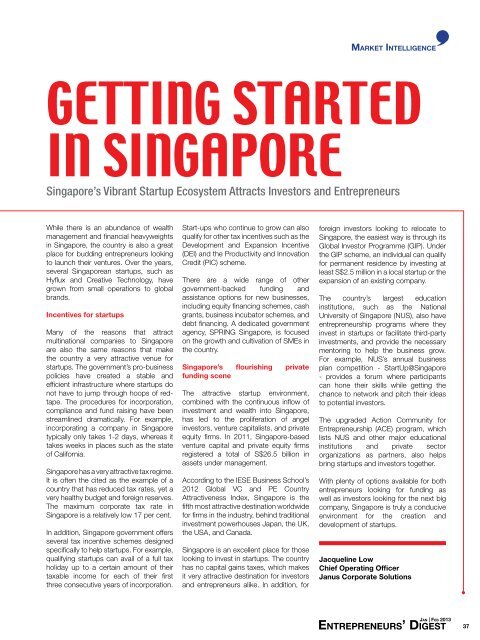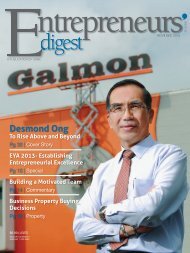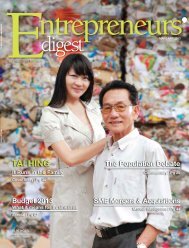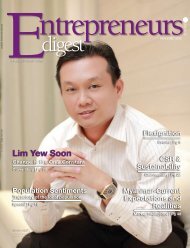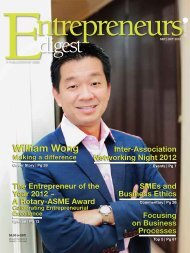ED 47: January-February 2013
You also want an ePaper? Increase the reach of your titles
YUMPU automatically turns print PDFs into web optimized ePapers that Google loves.
ma r k E t in t E l l i gE n C E<br />
GettinG Started<br />
in SinGapore<br />
Singapore’s vibrant Startup ecosystem Attracts investors and entrepreneurs<br />
While there is an abundance of wealth<br />
management and financial heavyweights<br />
in Singapore, the country is also a great<br />
place for budding entrepreneurs looking<br />
to launch their ventures. Over the years,<br />
several Singaporean startups, such as<br />
Hyflux and Creative Technology, have<br />
grown from small operations to global<br />
brands.<br />
incentives for startups<br />
Many of the reasons that attract<br />
multinational companies to Singapore<br />
are also the same reasons that make<br />
the country a very attractive venue for<br />
startups. The government’s pro-business<br />
policies have created a stable and<br />
efficient infrastructure where startups do<br />
not have to jump through hoops of redtape.<br />
The procedures for incorporation,<br />
compliance and fund raising have been<br />
streamlined dramatically. For example,<br />
incorporating a company in Singapore<br />
typically only takes 1-2 days, whereas it<br />
takes weeks in places such as the state<br />
of California.<br />
Singapore has a very attractive tax regime.<br />
It is often the cited as the example of a<br />
country that has reduced tax rates, yet a<br />
very healthy budget and foreign reserves.<br />
The maximum corporate tax rate in<br />
Singapore is a relatively low 17 per cent.<br />
In addition, Singapore government offers<br />
several tax incentive schemes designed<br />
specifically to help startups. For example,<br />
qualifying startups can avail of a full tax<br />
holiday up to a certain amount of their<br />
taxable income for each of their first<br />
three consecutive years of incorporation.<br />
Start-ups who continue to grow can also<br />
qualify for other tax incentives such as the<br />
Development and Expansion Incentive<br />
(DEI) and the Productivity and Innovation<br />
Credit (PIC) scheme.<br />
There are a wide range of other<br />
government-backed funding and<br />
assistance options for new businesses,<br />
including equity financing schemes, cash<br />
grants, business incubator schemes, and<br />
debt financing. A dedicated government<br />
agency, SPRING Singapore, is focused<br />
on the growth and cultivation of SMEs in<br />
the country.<br />
Singapore’s flourishing private<br />
funding scene<br />
The attractive startup environment,<br />
combined with the continuous inflow of<br />
investment and wealth into Singapore,<br />
has led to the proliferation of angel<br />
investors, venture capitalists, and private<br />
equity firms. In 2011, Singapore-based<br />
venture capital and private equity firms<br />
registered a total of S$26.5 billion in<br />
assets under management.<br />
According to the IESE Business School’s<br />
2012 Global VC and PE Country<br />
Attractiveness Index, Singapore is the<br />
fifth most attractive destination worldwide<br />
for firms in the industry, behind traditional<br />
investment powerhouses Japan, the UK,<br />
the USA, and Canada.<br />
Singapore is an excellent place for those<br />
looking to invest in startups. The country<br />
has no capital gains taxes, which makes<br />
it very attractive destination for investors<br />
and entrepreneurs alike. In addition, for<br />
foreign investors looking to relocate to<br />
Singapore, the easiest way is through its<br />
Global Investor Programme (GIP). Under<br />
the GIP scheme, an individual can qualify<br />
for permanent residence by investing at<br />
least S$2.5 million in a local startup or the<br />
expansion of an existing company.<br />
The country’s largest education<br />
institutions, such as the National<br />
University of Singapore (NUS), also have<br />
entrepreneurship programs where they<br />
invest in startups or facilitate third-party<br />
investments, and provide the necessary<br />
mentoring to help the business grow.<br />
For example, NUS’s annual business<br />
plan competition - StartUp@Singapore<br />
- provides a forum where participants<br />
can hone their skills while getting the<br />
chance to network and pitch their ideas<br />
to potential investors.<br />
The upgraded Action Community for<br />
Entrepreneurship (ACE) program, which<br />
lists NUS and other major educational<br />
institutions and private sector<br />
organizations as partners, also helps<br />
bring startups and investors together.<br />
With plenty of options available for both<br />
entrepreneurs looking for funding as<br />
well as investors looking for the next big<br />
company, Singapore is truly a conducive<br />
environment for the creation and<br />
development of startups.<br />
Jacqueline low<br />
chief operating officer<br />
Janus corporate Solutions<br />
Ja n | FE b <strong>2013</strong><br />
En t r E p r E n E u r s’ Di g E s t<br />
37


